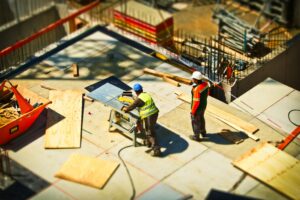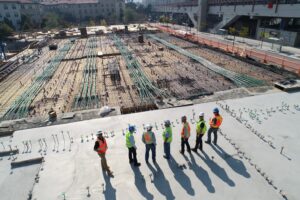The new Building Safety Regulator (BSR) has published its first three-year strategic plan in which it sets out how it plans to oversee a “culture of higher standards” in building health and safety.
 The new independent regulator was created by the Building Safety Act 2022 and is part of the Health and Safety Executive (HSE).
The new independent regulator was created by the Building Safety Act 2022 and is part of the Health and Safety Executive (HSE).
It has been established to help raise building safety and performance standards across all types of buildings in Britain, increase the competence of relevant regulators and industry professionals, and introduce a new stringent regime for high-rise residential buildings.
Change in building safety culture and behaviours needed
In its first three-year strategic plan, the BSR has outlined its plans to promote a “critical change in culture and behaviours” across building safety.
The plan sets out their vision to establish a built environment in which all workers are competent and everyone takes responsibility to ensure buildings are of a high quality and are safe.
 The HSE says that the formation of the BSR marks “the most significant change to regulation of building safety for a generation.”
The HSE says that the formation of the BSR marks “the most significant change to regulation of building safety for a generation.”
It will provide assurance to residents and other building users that the building industry is working together to ensure that the tragedies of the past will never be repeated.
The Building Safety Regulator has been established to:
- Improve the safety and drive up the standards of all buildings
- Make sure the residents of higher-risk buildings are safe and feel safe in their homes
- Help restore public trust in the built environment sector
The regulator has said it intends to do this by delivering consistent high standards within the building control profession and driving improvements across the whole built environment. The BSR will also be responsible for regulating the planning, design and construction of new higher-risk buildings and ensuring those who are responsible for occupied higher risk buildings mange risks to keep residents safe.
Putting building safety first
Working in partnership with co-regulators is key to ensuring building safety, now and in the future.
HSE’s Director of Building Safety, Philip White, commented:
“This strategic plan sets out the guiding principles we have put in place to keep us focused on our priorities in delivering the new regime, and we will keep it under continuous review. We will ensure we have the right capability and capacity to meet this challenge as our remit continues to evolve, working with others sharing knowledge, expertise, and data.
“Our focus is clear and resolute as we oversee a culture of higher standards, putting building safety first. Our regulatory activities will be conducted in a way which is transparent, accountable, proportionate, and consistent.
“Throughout the next three years, BSR will continue to work across all sectors to ensure that those working in the building sector engage fully with the new regime. Our aim is that people will see fundamental changes to the safety and standard of all buildings and increased competency among industry professionals that raises those standards year on year.”
Meanwhile, the Chair of the HSE, Sarah Newton, added that the BSR’s new three-year strategy was a “strong, coherent strategy” that had been “built on collaboration with all BSR’s stakeholders, with a keen focus on ensuring industry takes ownership and responsibility for delivering a safe system throughout the life cycle of a building.”
She added:
“This must be front of mind for everyone. And everyone must be aware of their legal responsibilities. Collaboration and collective responsibility are key for delivering better standards.”
The BSR’s Strategic Plan for 2023-2026 can be viewed online at the HSE’s website.
Construction safety training and support
 First Response Training (FRT) is a leading, national training provider.
First Response Training (FRT) is a leading, national training provider.
They deliver a wide and diverse range of training courses in the fields of health and safety, first aid, fire safety, manual handling, food hygiene, specialist safety, mental health, health and social care and more.
They can offer courses in subjects such as Asbestos Awareness, Handling of Hazardous Substances and accredited options such as IOSH Working Safely and IOSH Managing Safely.
A trainer from FRT says:
“The building industry is consistently one of the most dangerous sectors to work within in Great Britain, and recent high profile tragedies have also meant that the end user can sometimes feel anxious and unsafe in a finished building.
“It’s essential that there is a positive health and safety culture throughout the building industry and that everyone involved in building work contributes to building safety through high standards and adherence to legislation, guidance and best practice.
“Proper health and safety training is absolutely key for anyone working in building and construction.”
For more information on any of the training courses that FRT can offer, please call them on freephone 0800 310 2300 or send an e-mail to info@firstresponsetraining.com.
